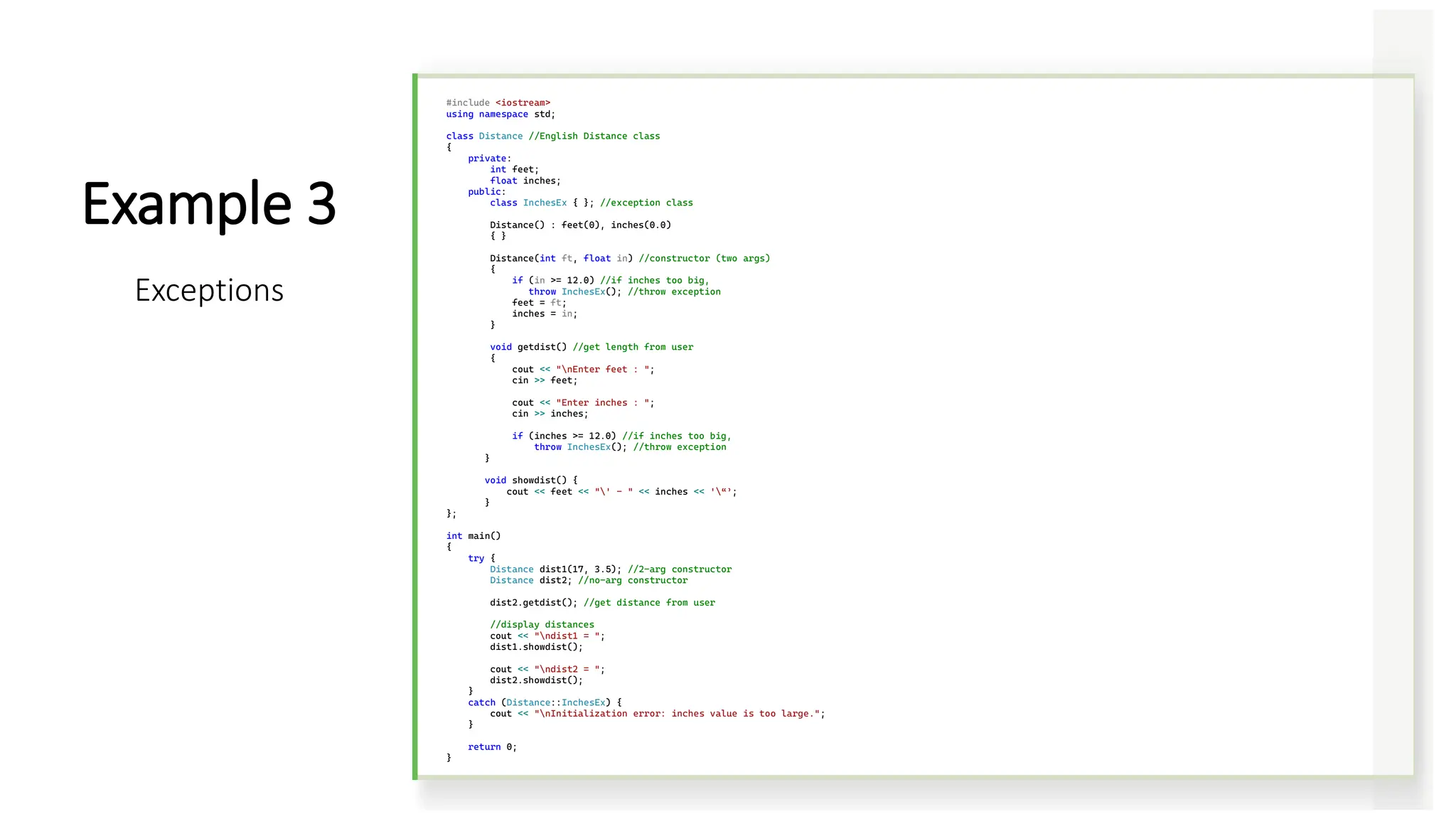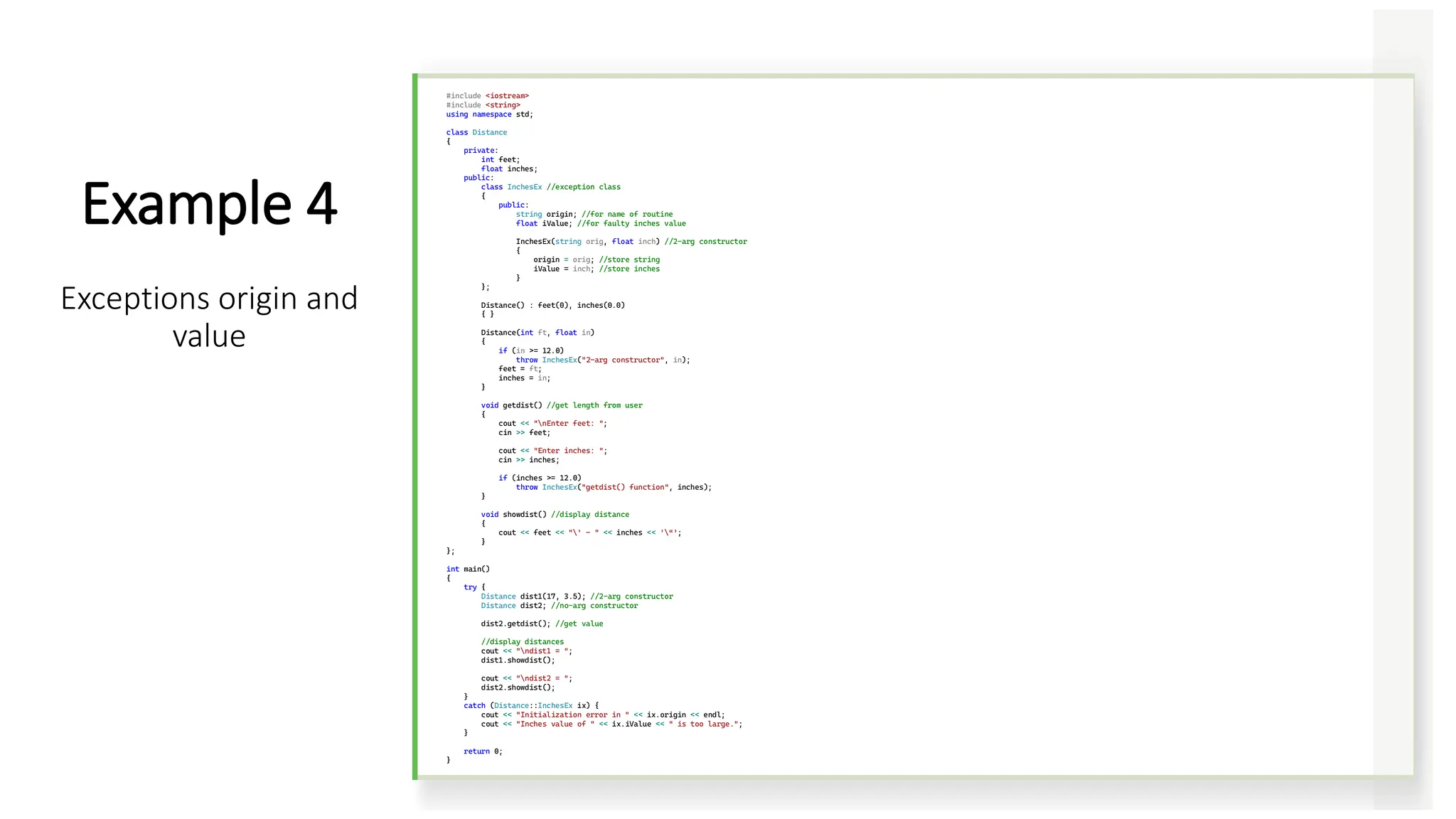The document provides an overview of object-oriented programming using C++, focusing on key concepts such as the 'this' pointer, templates, and exception handling. It includes multiple examples demonstrating the use of member functions, operator overloading, and function templates. Additionally, it explores the implementation of exception handling mechanisms to manage errors within the application.
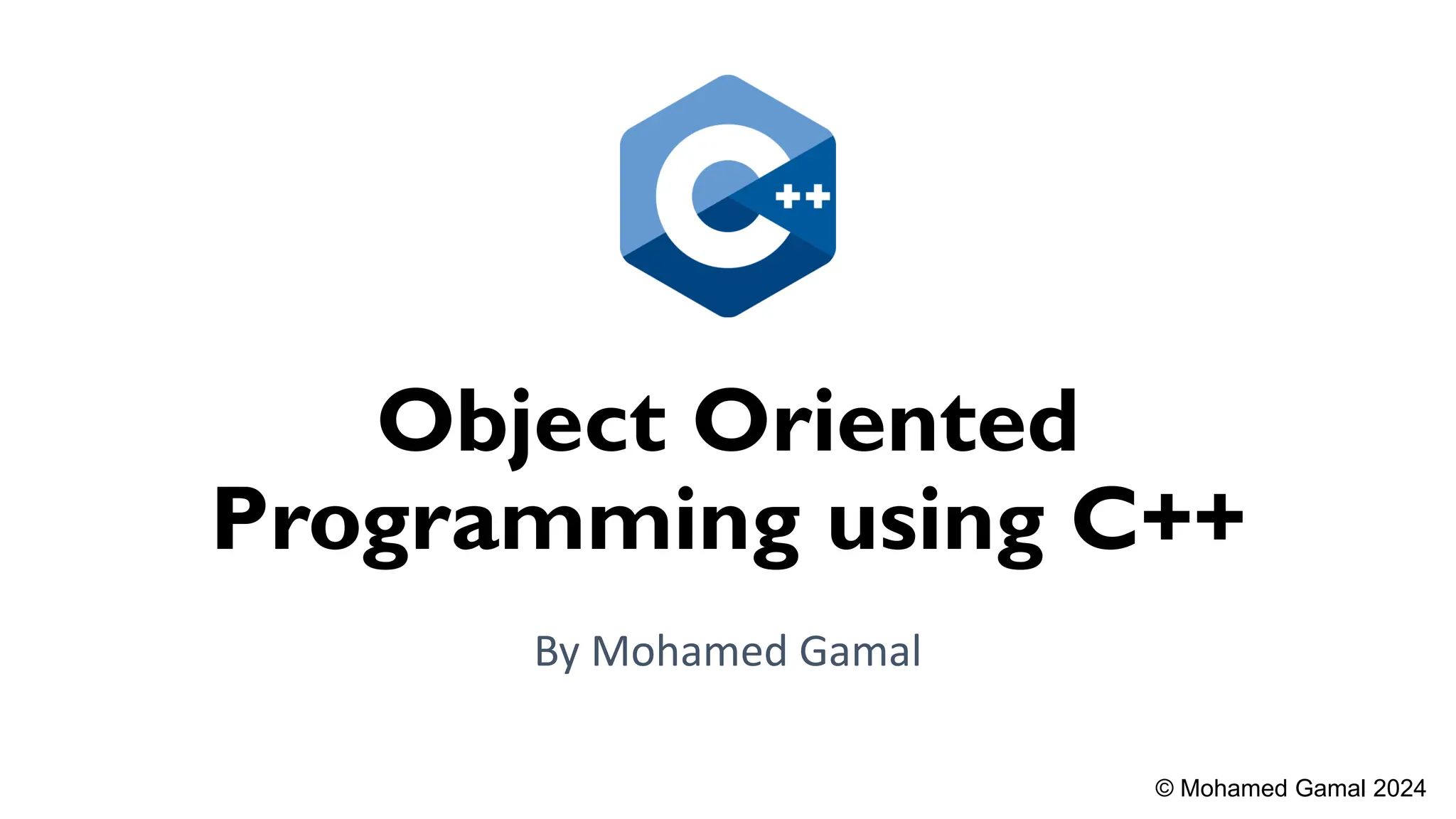
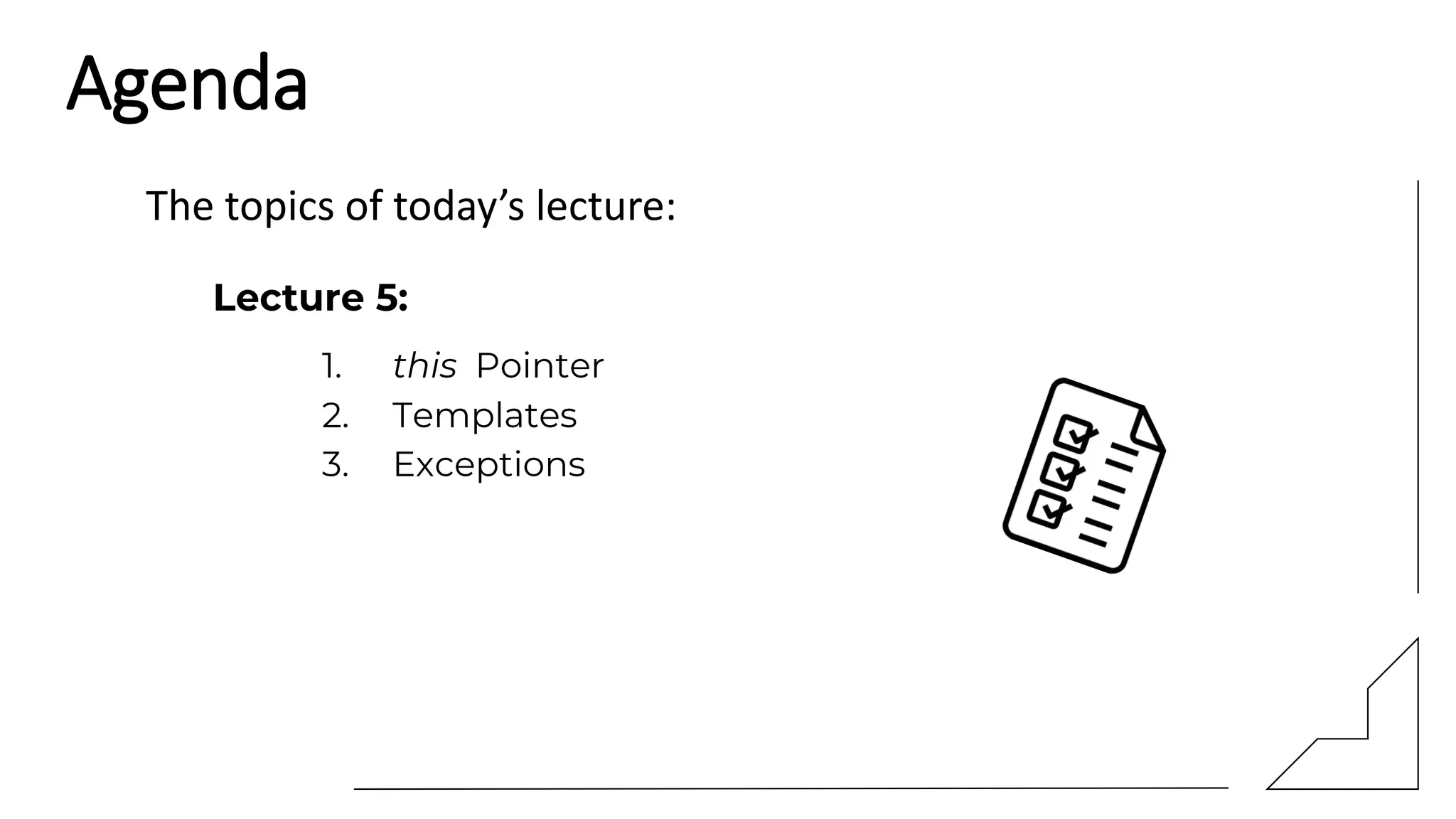

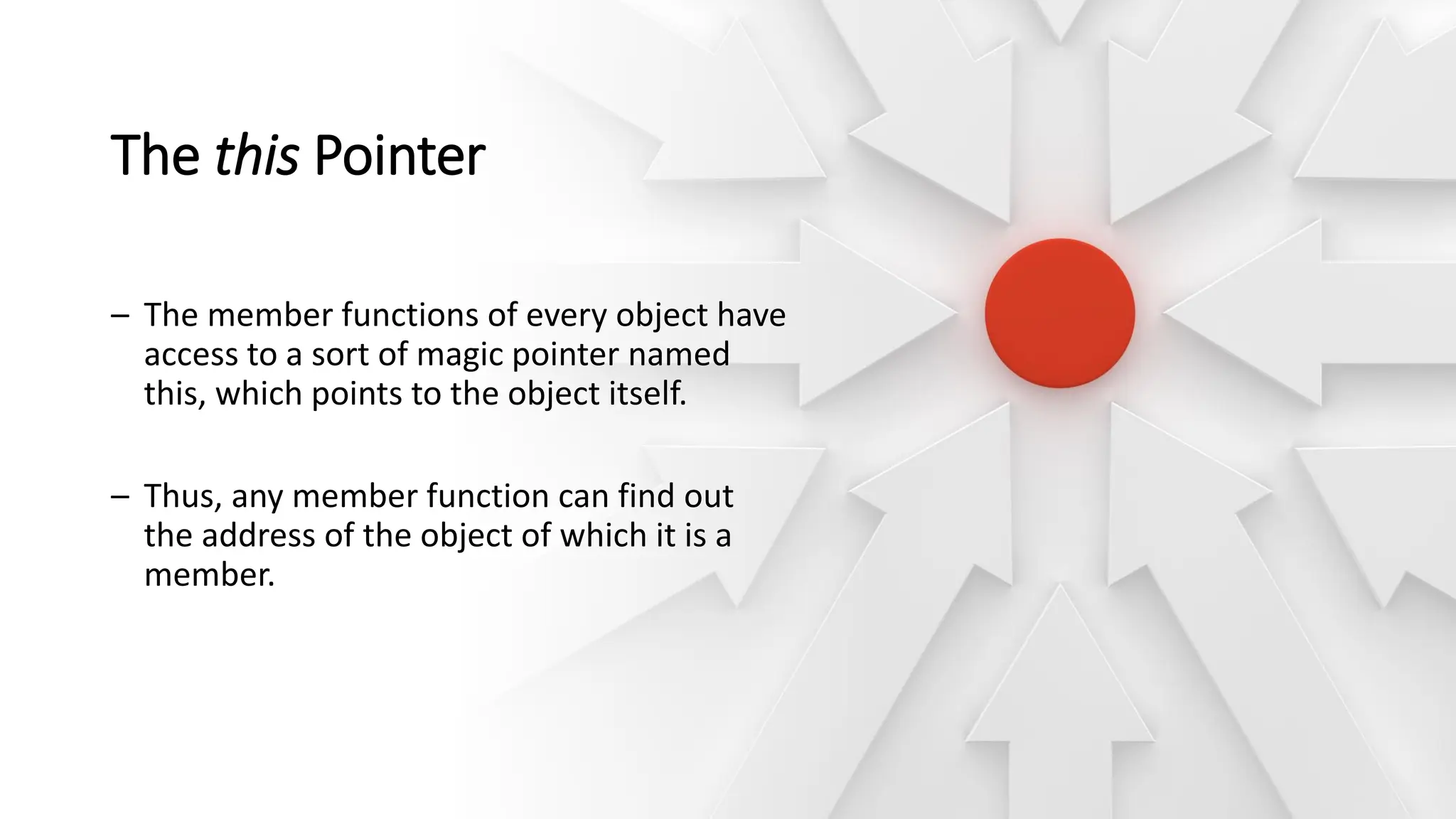
![#include <iostream>
using namespace std;
class where
{
private:
char charray[10]; //occupies 10 bytes
public:
void reveal() {
cout << "nMy object's address is " << this;
}
};
int main()
{
where w1, w2, w3; //make three objects
w1.reveal(); //see where they are
w2.reveal();
w3.reveal();
return 0;
}
Example 1
this Pointer](https://image.slidesharecdn.com/oopusingclanguage-lecture5-240918193533-e65f8296/75/Object-Oriented-Programming-OOP-using-C-Lecture-5-5-2048.jpg)
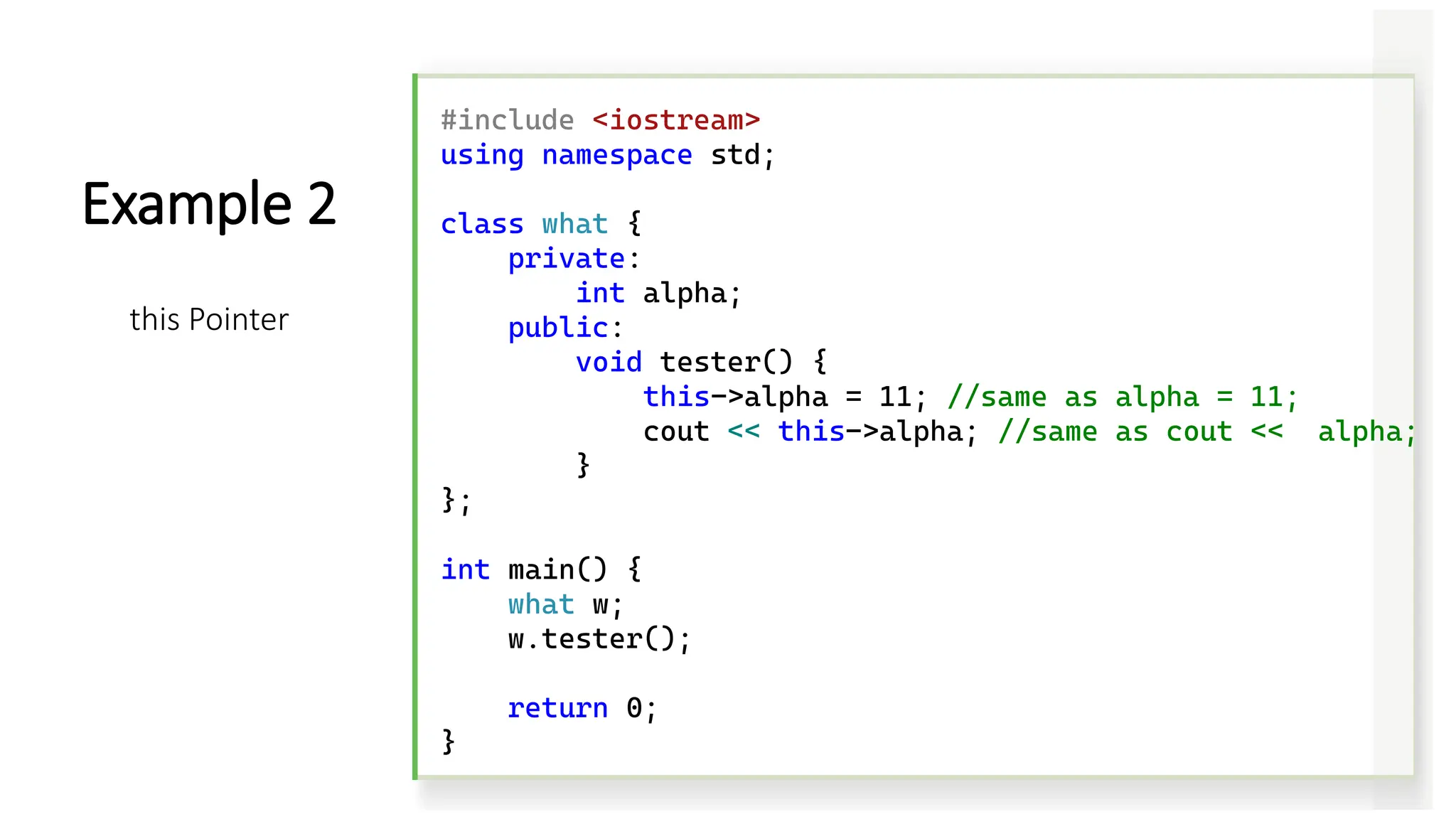
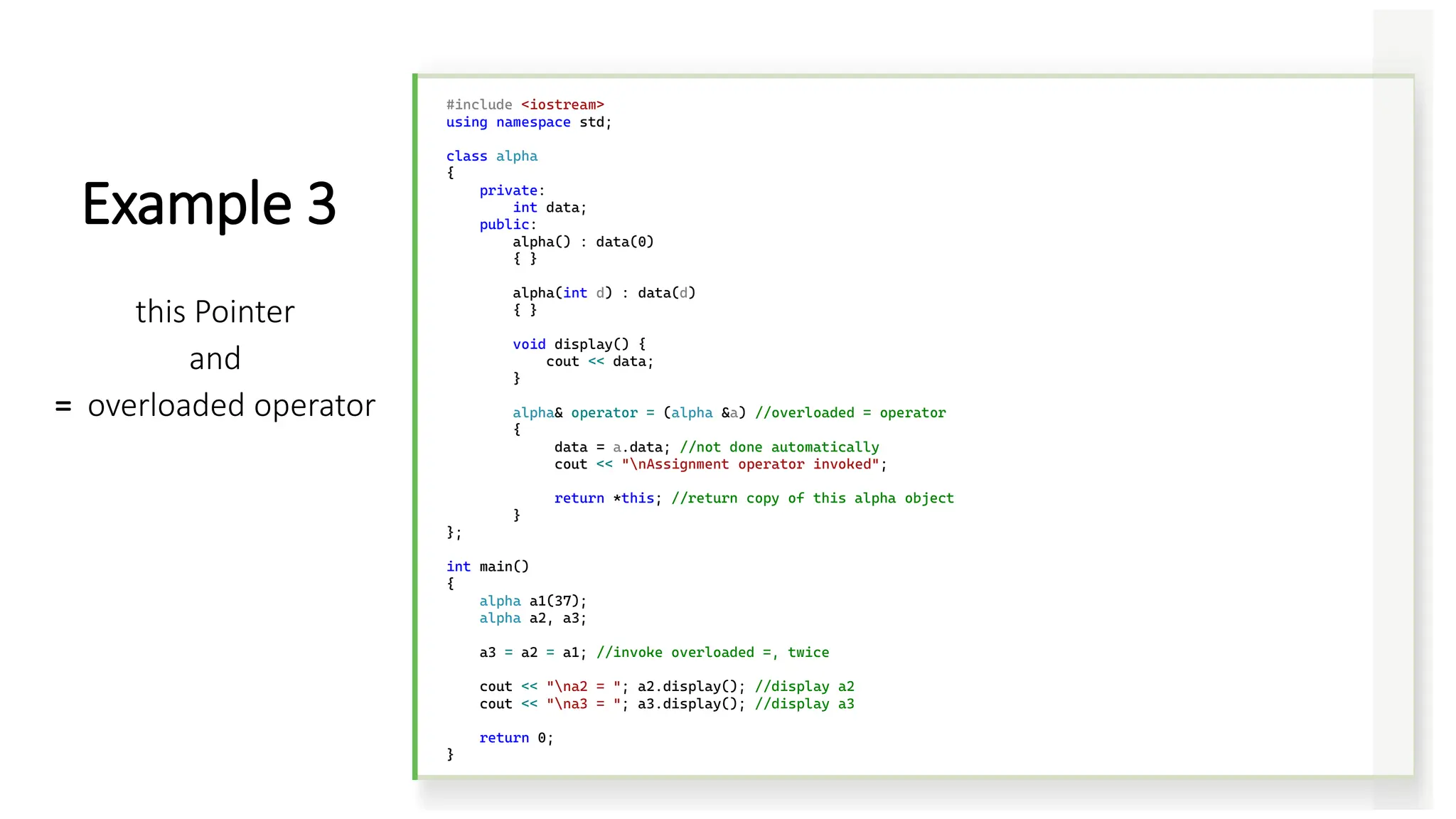


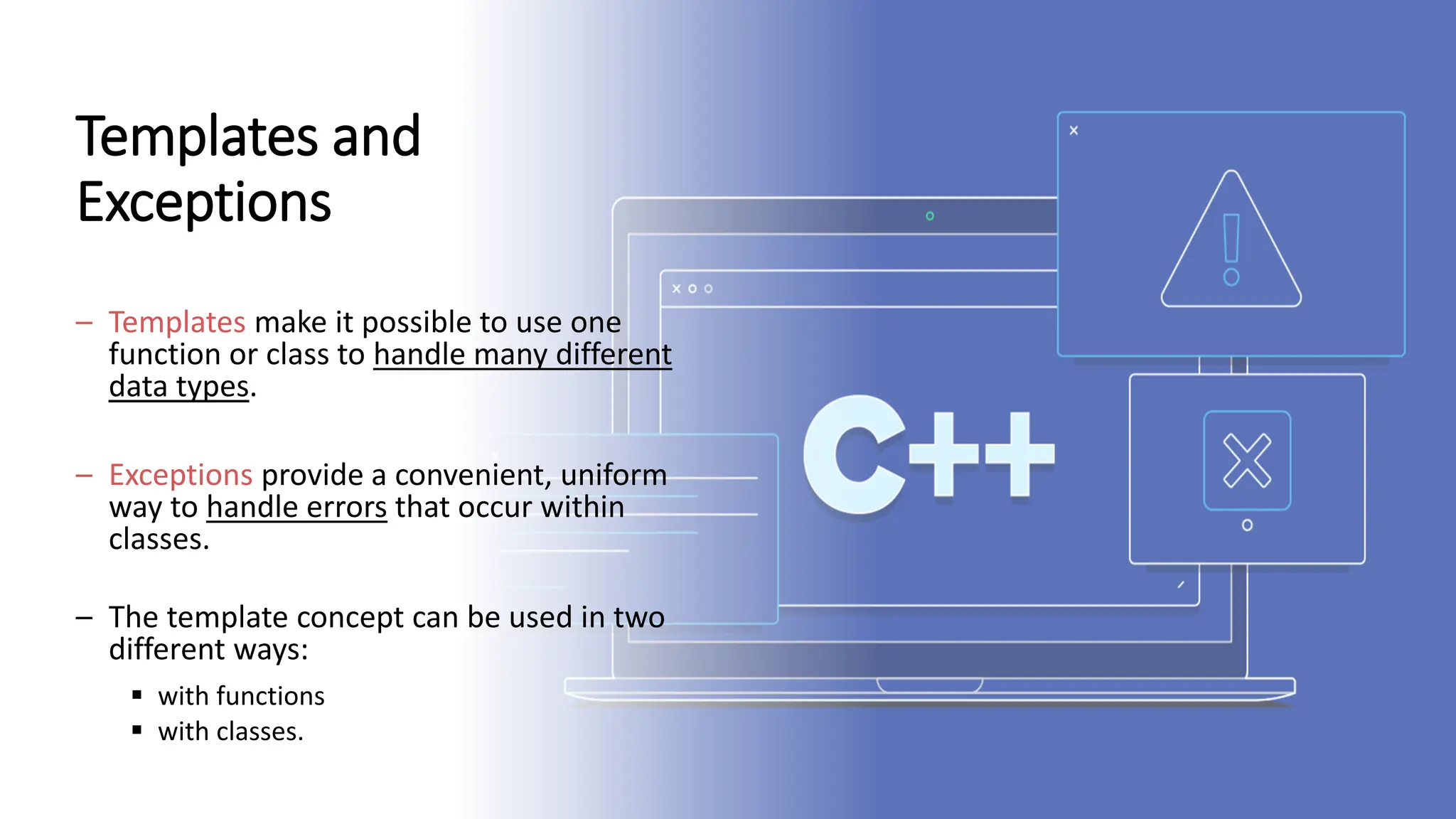
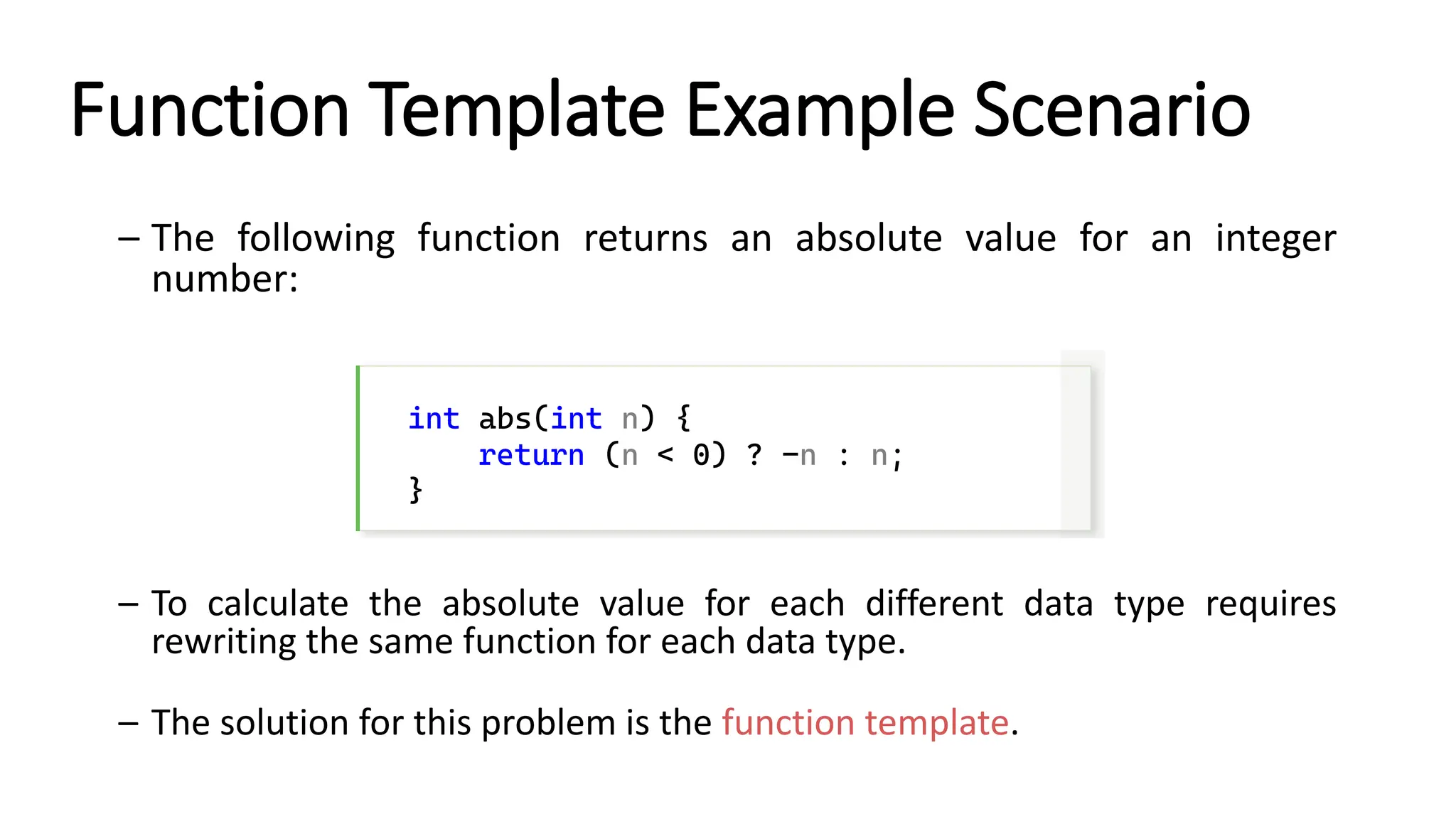
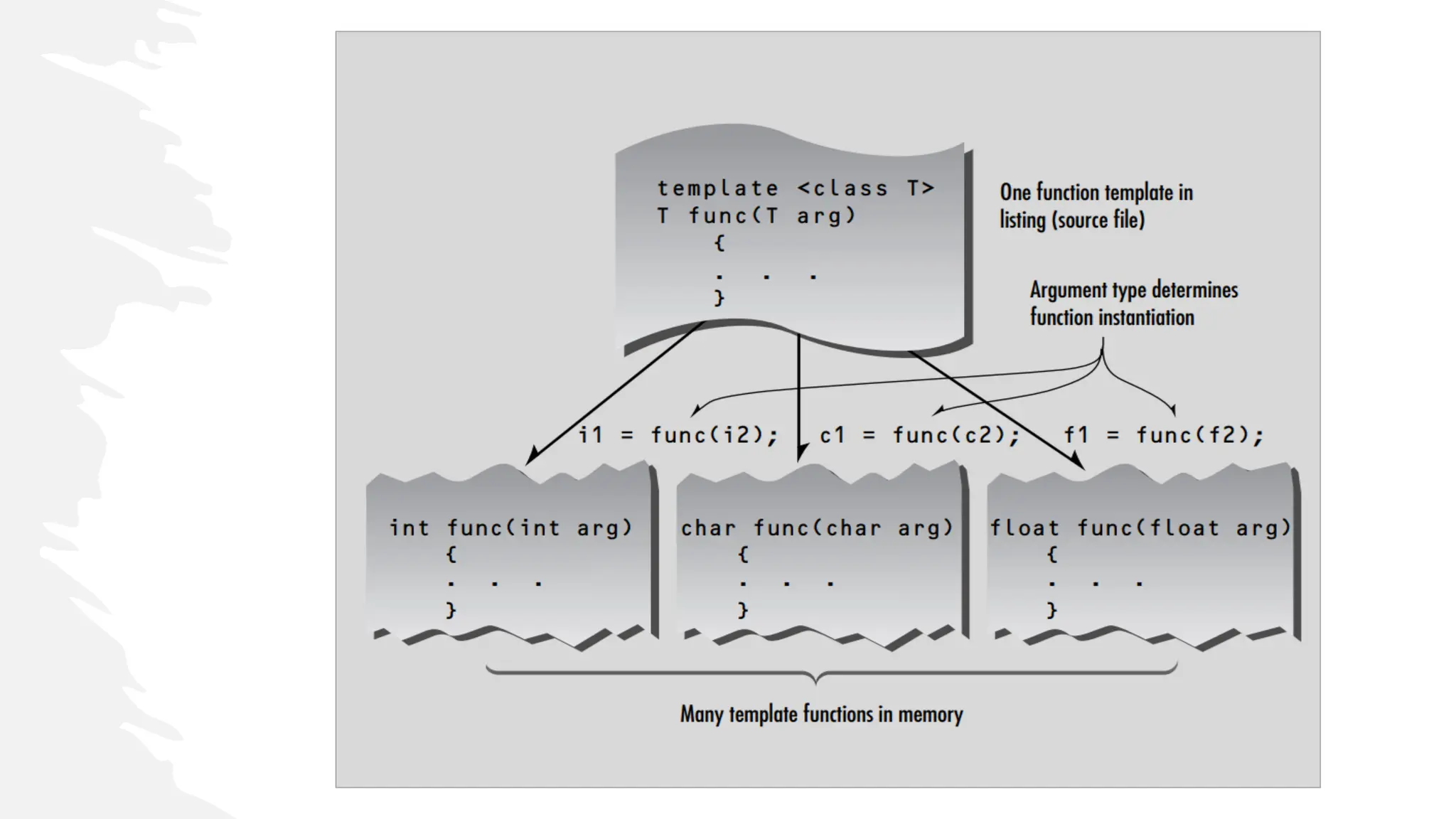
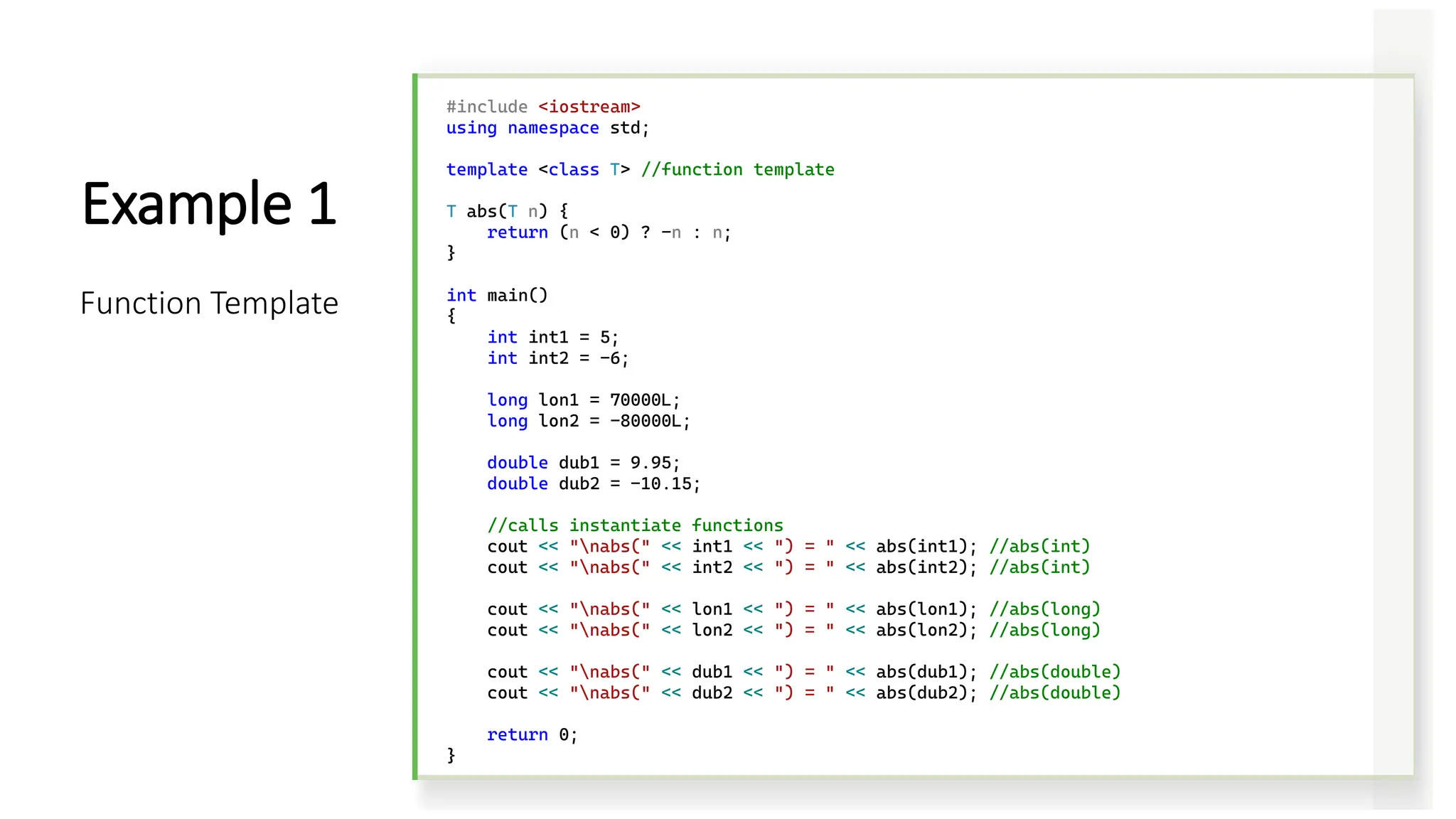
![#include <iostream>
using namespace std;
//function returns index number of item, or -1 if not found
template <class atype>
int find(atype *array, atype value, int size)
{
for (int j = 0; j < size; j++)
if (array[j] == value)
return j;
return -1;
}
char chrArr[] = { 1, 3, 5, 9, 11, 13 }; //array
char ch = 5; //value to find
int intArr[] = { 1, 3, 5, 9, 11, 13 };
int in = 6;
long lonArr[] = { 1L, 3L, 5L, 9L, 11L, 13L };
long lo = 11L;
double dubArr[] = { 1.0, 3.0, 5.0, 9.0, 11.0, 13.0 };
double db = 4.0;
int main()
{
cout << "n 5 in chrArray, index = " << find(chrArr, ch, 6);
cout << "n 6 in intArray, index = " << find(intArr, in, 6);
cout << "n11 in lonArray, index = " << find(lonArr, lo, 6);
cout << "n 4 in dubArray, index = " << find(dubArr, db, 6);
return 0;
}
Example 2
Function Template](https://image.slidesharecdn.com/oopusingclanguage-lecture5-240918193533-e65f8296/75/Object-Oriented-Programming-OOP-using-C-Lecture-5-14-2048.jpg)
![#include <iostream>
using namespace std;
const int MAX = 100; //size of array
template <class Type>
class Stack
{
private:
Type st[MAX]; //stack: array of any type
int top; //number of top of stack
public:
Stack() //constructor
{
top = -1;
}
void push(Type var) //put number on stack
{
st[++top] = var;
}
Type pop() //take number off stack
{
return st[top--];
}
};
int main()
{
Stack<float> s1; //s1 is object of class Stack<float>
s1.push(1111.1F); //push 3 floats, pop 3 floats
s1.push(2222.2F);
s1.push(3333.3F);
cout << "1: " << s1.pop() << endl;
cout << "2: " << s1.pop() << endl;
cout << "3: " << s1.pop() << endl;
Stack<long> s2; //s2 is object of class Stack<long>
s2.push(123123123L); //push 3 longs, pop 3 longs
s2.push(234234234L);
s2.push(345345345L);
cout << "1: " << s2.pop() << endl;
cout << "2: " << s2.pop() << endl;
cout << "3: " << s2.pop() << endl;
return 0;
}
Example 3
Function Template](https://image.slidesharecdn.com/oopusingclanguage-lecture5-240918193533-e65f8296/75/Object-Oriented-Programming-OOP-using-C-Lecture-5-15-2048.jpg)
![#include <iostream>
using namespace std;
const int LEN = 80; //maximum length of names
class employee //employee class
{
private:
char name[LEN]; //employee name
unsigned long number; //employee number
public:
friend istream & operator >> (istream &s, employee &e);
friend ostream & operator << (ostream &s, employee &e);
};
istream & operator >> (istream &s, employee &e)
{
cout << "n Enter last name: ";
cin >> e.name;
cout << " Enter number: ";
cin >> e.number;
return s;
}
ostream & operator << (ostream &s, employee &e)
{
cout << "n Name : " << e.name;
cout << "n Number : " << e.number;
return s;
}
template<class TYPE> //struct "link<TYPE>"
struct link //one element of list
{
TYPE data; //data item
link* next; //pointer to next link
};
template<class TYPE> //class "linklist<TYPE>"
class linklist //a list of links
{
private:
link<TYPE> *first; //pointer to first link
public:
linklist() //no-argument constructor
{
first = NULL; //no first link
}
void additem(TYPE d); //add data item (one link)
void display(); //display all links
};
template<class TYPE>
void linklist<TYPE>::additem(TYPE d) //add data item
{
link<TYPE> *newlink = new link<TYPE>; //make a new link
newlink->data = d; //give it data
newlink->next = first; //it points to next link
first = newlink; //now first points to this
}
template<class TYPE>
void linklist<TYPE>::display() //display all links
{
link<TYPE> *current = first; //set ptr to first link
while (current != NULL) //quit on last link
{
cout << endl << current->data; //display data
current = current->next; //move to next link
}
}
int main()
{ //lemp is object of
linklist<employee> lemp; //class "linklist<employee>”
employee emptemp; //temporary employee storage
char ans; //user's response
do
{
cin >> emptemp; //get employee data from user
lemp.additem(emptemp); //add it to linked list ‘lemp’
cout << "nAdd another (y/n)? ";
cin >> ans;
} while (ans != 'n'); //when user is done,
lemp.display(); //display entire linked list
return 0;
}
Linked List Class
Using
Templates
Example](https://image.slidesharecdn.com/oopusingclanguage-lecture5-240918193533-e65f8296/75/Object-Oriented-Programming-OOP-using-C-Lecture-5-16-2048.jpg)

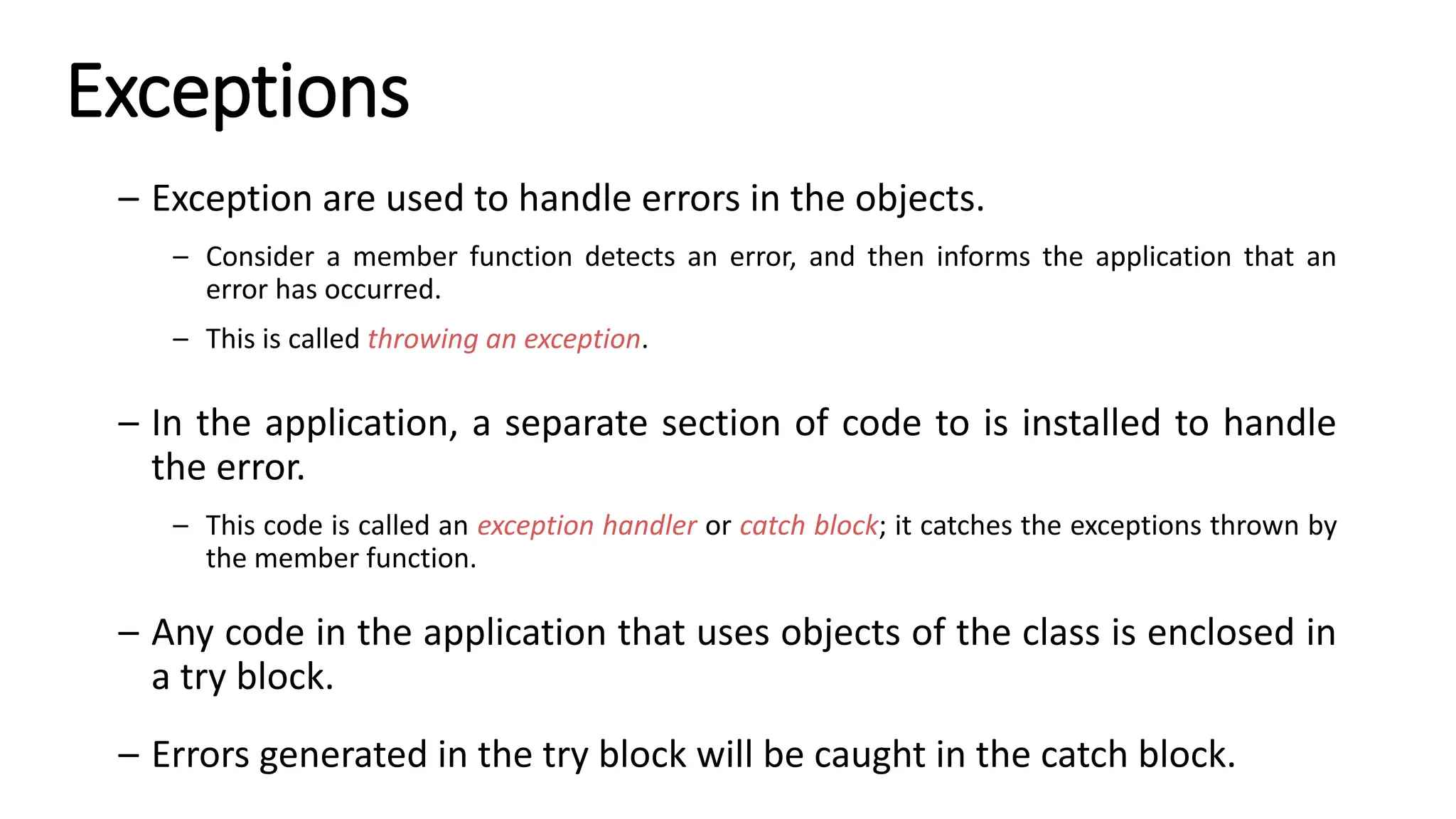
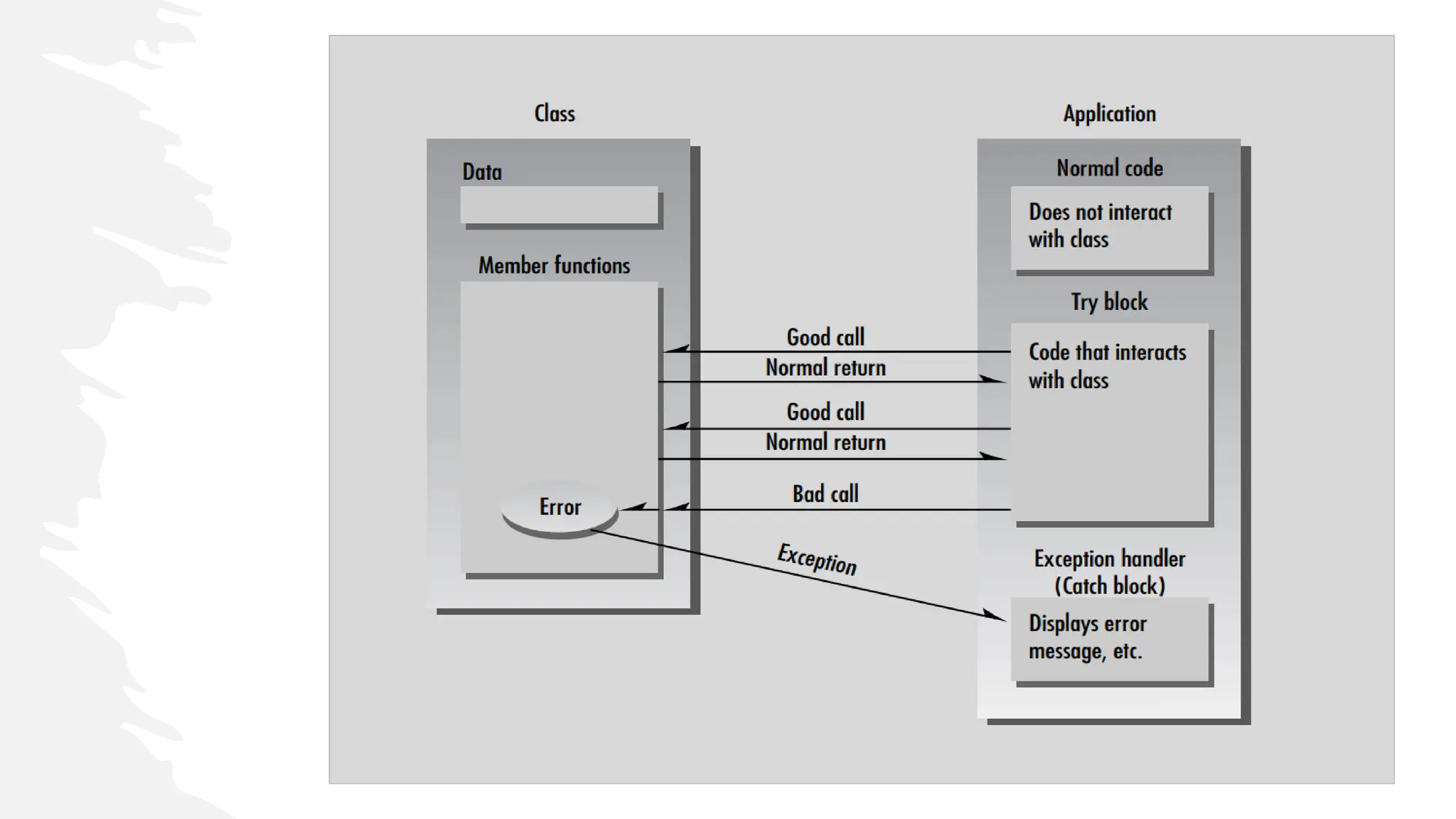
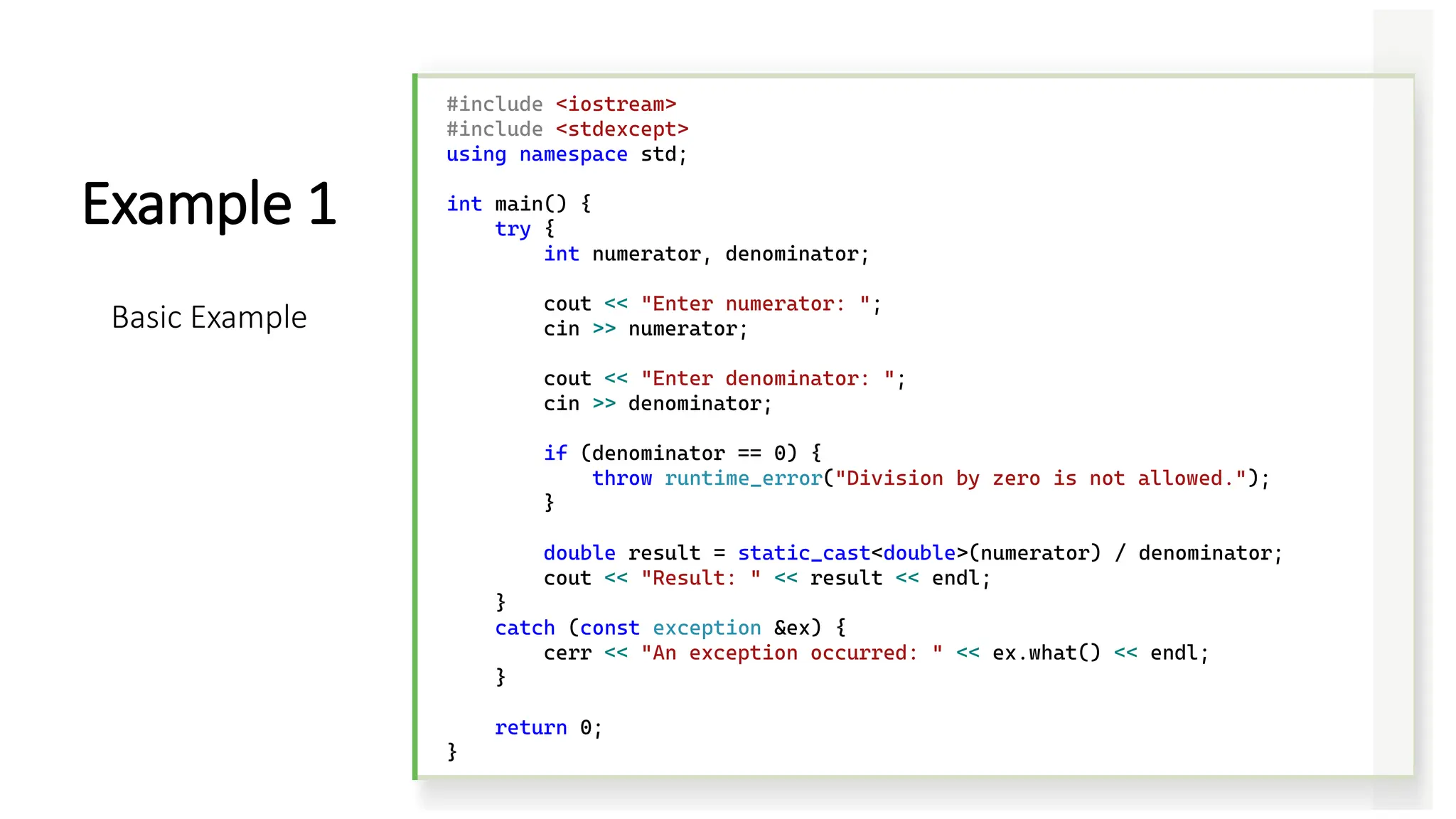
![#include <iostream>
using namespace std;
const int MAX = 3; //stack holds 3 integers
class Stack
{
private:
int st[MAX]; //stack: array of integers
int top; //index of top of stack
public:
class Full { }; //exception class
class Empty { }; //exception class
Stack() : top(-1)
{ }
void push(int var) //put number on stack
{
if (top >= MAX - 1) //if stack full,
throw Full(); //throw Full exception
st[++top] = var;
}
int pop() //take number off stack
{
if (top < 0) //if stack empty,
throw Empty(); //throw Empty exception
return st[top--];
}
};
int main()
{
Stack s1;
try {
s1.push(11);
s1.push(22);
s1.push(33);
// s1.push(44); //oops: stack full
cout << "1: " << s1.pop() << endl;
cout << "2: " << s1.pop() << endl;
cout << "3: " << s1.pop() << endl;
// cout << "4: " << s1.pop() << endl; //oops: stack empty
}
catch (Stack::Full) {
cout << "Exception: Stack Full" << endl;
}
catch (Stack::Empty) {
cout << "Exception: Stack Empty" << endl;
}
return 0;
}
Example 2
Exceptions](https://image.slidesharecdn.com/oopusingclanguage-lecture5-240918193533-e65f8296/75/Object-Oriented-Programming-OOP-using-C-Lecture-5-21-2048.jpg)
